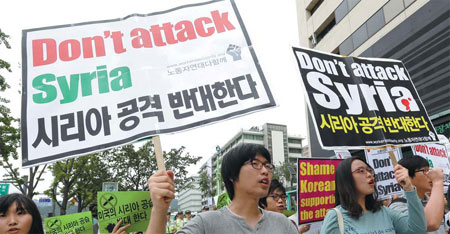Obama arrives at G20 to push for Syria strike
US President Barack Obama arrived on Wednesday in St Petersburg for the G20 summit in Russia, where officials said he would argue his case for military action against the Syrian government over an alleged chemical weapons attack.
An Obama aide said there were still no plans for a meeting between Obama and Russian President Vladimir Putin, who are bitterly divided over Syria, but added that they would have a chance to "have interactions" on the sidelines of the meeting of heads of states of the world's biggest emerging and developed economies.
Ben Rhodes, who is Obama's Deputy National Security Adviser for Strategic Communications, said US officials will "continue to discuss with the Russian (side) what our evidentiary basis is" for claims of a chemical weapons attack by the Syrian government.
But the United States did not want to have a debate on whether the attack actually took place, he said.
Rhodes said Obama accepted that not every G20 member would agree "about the way forward in Syria, particularly given the Russian position".
Nevertheless, he would "explain our current thinking" to allies and partners and explore what type of "political and diplomatic support they may express for our efforts to hold the Syrian regime accountable".
The US has France's support for military action in Syria, but several other G20 powers including China and Germany have firmly voiced their opposition.
In Washington, Obama's advisers were pressing Congress on Thursday, this time in closed-door meetings, for its authorization of a military strike on Syria.
The Obama administration was turning its attention to the opposition Republican-controlled House of Representatives after the Senate Foreign Relations Committee voted 10-7 on Wednesday to authorize the "limited and specified use" of the armed forces against Syria. It voted to support a resolution that restricts military action to 90 days and bars US ground troops from combat.
The vote marked the first formal response in Congress, four days after Obama surprised the world by putting off an anticipated cruise missile strike against Syria and instead asked lawmakers to unite behind such a plan.
The administration's plan for military action in Syria needs approval from committees in both chambers and then approval from both full chambers to go ahead. The measure is expected to reach the Senate floor next week. The timing in the House is more uncertain.
But Obama on Wednesday, asked whether he would take action if he fails to get approval from Congress, told reporters in Sweden that as commander in chief, "I always preserve the right and the responsibility to act on behalf of America's national security".
AFP-AP
|
South Korean protesters shout slogans against possible US military action in Syria, near the US embassy in Seoul on Thursday. Lee Jin-Man / Associated Press |



















